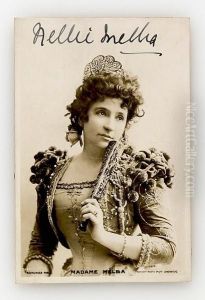Melba, Nellie Paintings
Dame Nellie Melba, born Helen Porter Mitchell on May 19, 1861, in Richmond, Victoria, Australia, was one of the most renowned operatic sopranos of her time. She adopted the stage name 'Melba' from Melbourne, her home city, marking the beginning of a career that would see her become an international superstar. Her father, David Mitchell, was a successful building contractor and a strict disciplinarian, while her mother, Isabella Ann, née Dow, was a nurturing figure who supported her daughter's early interest in music.
Melba's vocal talents were evident from a young age, leading her to pursue serious study. After an unsuccessful marriage to Charles Nisbett Frederick Armstrong in 1882, with whom she had one son, George, Melba moved to Europe to further her career. She studied under the renowned Mathilde Marchesi in Paris, who helped refine her voice into the powerful, clear, and flexible instrument that would captivate audiences worldwide. Her debut in 1887 at La Monnaie in Brussels as Gilda in Verdi's 'Rigoletto' was a turning point, leading to engagements at the leading opera houses of Europe, including a long and famed association with London's Royal Opera House, Covent Garden.
Melba's repertoire was vast, ranging from Mozart to Wagner, but she was especially celebrated for her performances in roles such as Violetta in Verdi's 'La Traviata', Mimì in Puccini's 'La Bohème', and the title role in Donizetti's 'Lucia di Lammermoor'. Her voice was noted for its pure tone, excellent pitch, and the effortless agility which allowed her to tackle the most challenging coloratura passages. Throughout her career, Melba made numerous recordings, many of which are still available, providing a glimpse into the artistry of a bygone era. She was also a pioneer in the use of radio, giving the first-ever concert broadcast over the airwaves in 1920.
Despite her international success, Melba remained deeply connected to Australia, returning often and promoting Australian music and musicians. She was made Dame Commander of the British Empire in 1918 for her contributions to the arts and charity work during World War I. After an illustrious career, Dame Nellie Melba died of septicemia following surgery in Sydney on February 23, 1931. Her legacy is preserved not only in her recordings but also in her eponymous contributions to culinary arts, including the creation of Peach Melba and Melba toast, and in institutions such as the Melba Conservatorium in Melbourne. Melba's life and career were marked by her relentless pursuit of perfection, her pioneering spirit, and her generous mentorship of emerging artists.
